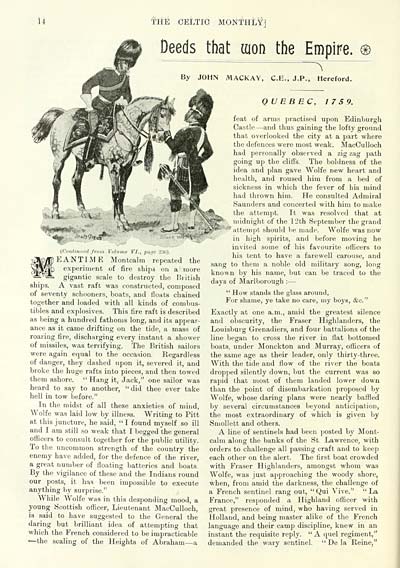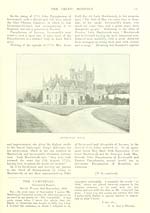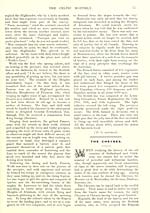Blair Collection > Celtic monthly > Volume 7, 1899
(28)
Download files
Complete book:
Individual page:
Thumbnail gallery: Grid view | List view

14
THE CELTIC MONTHLY]
Deeds that caon the Empire. ^
By JOHN MACKAY, C.E., J. P., Hereford.
■'^-f:!9>tuS^
■■mluv;l f,;„n \\:h,i,u- VI., pa,,r ::.:■■■)
lEANTIME Montcalm repeated the
experiment of fire ships on a! more
gigantic scale to destroy the British
A vast raft was constructed, composed
of seventy schooners, boats, and floats chained
together and loaded with all kinds of combus-
tibles and explosives. This fire raft is described
as being a hundred fathoms long, and its appear-
ance as it came drifting on the tide, a mass of
roaring fire, discharging every instant a shower
of missiles, was terrifying, The British sailors
were again equal to the occasion. Regardless
of danger, they dashed upon it, severed it, and
broke the huge rafts into pieces, and then towed
them ashore. " Hang it, Jack," one sailor was
heard to say to another, "did thee ever take
hell in tow before."
In the midst of all these anxieties of mind,
Wolfe was laid low by illness. Writing to Pitt
at this juncture, he said, "I found myself so ill
and I am still so weak that I begged the general
ofiicers to consult together for the public utility.
To the uncommon strength of the country the
enemy have added, for the defence of the river,
a great number of floating batteries and boats.
By the vigilance of these and the Indians round
our posts, it has been impossible to execute
anything by surprise."
While Wolfe was in this desponding mood, a
young Scottish oflicer, Lieutenant MacCulloch,
is said to have suggested to the General the
daring but brilliant idea of attempting that
which the French considered to be impracticable
—the scaling of the Heights of Abraham — a
QUEBEC, I 7 59.
feat of arms practised upon Edinburgh
Castle — and thus gaining the lofty ground
that overlooked the city at a part where
the defences were most weak. MacCulloch
had personally observed a zig zag path
going up the clifis. The boldness of the
idea and plan gave Wolfe new heart and
health, and roused him from a bed of
sickness in which the fever of bis mind
had thrown him. He consulted Admiral
Saunders and concerted with him to make
,^ ,■ the attempt. It was resolved that at
"^'^ . midnight of the 12th September the grand
•''attempt should he made. Wolfe was now
in high spirits, and before moving he
invited some of his favourite olEcers to
his tent to have a farewell carouse, and
sang to them a noble old military song, long
known by his name, but can be traced to the
days of Marlborough : —
" How stands the glass around.
For shame, ye take no care, my boys, &c."
Exactly at one a.m., amid the greatest silence
and obscurity, the Eraser Highlanders, the
Louisbuig Grenadiers, and four battalions of the
line began to cross the river in Hat bottomed
boats, under Monckton and Murray, otficers of
the same age as their leader, only thirty-three.
With the tide and flow of the river the boats
dropped silently down, but the current was so
rapid that most of them landed lower down
than the point of disembarkation proposed by
Wolfe, whose daring plans were nearly baffled
by several circumstances beyond anticipation,
the most extraordinary of which is given by
Smollett and others.
A line of sentinels had Vieen posted by Mont-
calm along the banks of the St. Lawrence, with
orders to challenge all passing craft and to keep
each other on the alert. The tirst boat crowded
with Eraser Highlanders, amongst whom was
Wolfe, was just approaching the woody shore,
when, from amid the darkness, the challenge of
a Erench sentinel rang out, " Qui Vive." " La
Erance," responded a Highland oflicer with
great presence of mind, who having served in
Holland, and being n)aster alike of the Erench
language and their camp discipline, knew in an
instant the requisite reply. "A quel regiment,"
demanded the wary sentinel. " De la Reine,"
THE CELTIC MONTHLY]
Deeds that caon the Empire. ^
By JOHN MACKAY, C.E., J. P., Hereford.
■'^-f:!9>tuS^
■■mluv;l f,;„n \\:h,i,u- VI., pa,,r ::.:■■■)
lEANTIME Montcalm repeated the
experiment of fire ships on a! more
gigantic scale to destroy the British
A vast raft was constructed, composed
of seventy schooners, boats, and floats chained
together and loaded with all kinds of combus-
tibles and explosives. This fire raft is described
as being a hundred fathoms long, and its appear-
ance as it came drifting on the tide, a mass of
roaring fire, discharging every instant a shower
of missiles, was terrifying, The British sailors
were again equal to the occasion. Regardless
of danger, they dashed upon it, severed it, and
broke the huge rafts into pieces, and then towed
them ashore. " Hang it, Jack," one sailor was
heard to say to another, "did thee ever take
hell in tow before."
In the midst of all these anxieties of mind,
Wolfe was laid low by illness. Writing to Pitt
at this juncture, he said, "I found myself so ill
and I am still so weak that I begged the general
ofiicers to consult together for the public utility.
To the uncommon strength of the country the
enemy have added, for the defence of the river,
a great number of floating batteries and boats.
By the vigilance of these and the Indians round
our posts, it has been impossible to execute
anything by surprise."
While Wolfe was in this desponding mood, a
young Scottish oflicer, Lieutenant MacCulloch,
is said to have suggested to the General the
daring but brilliant idea of attempting that
which the French considered to be impracticable
—the scaling of the Heights of Abraham — a
QUEBEC, I 7 59.
feat of arms practised upon Edinburgh
Castle — and thus gaining the lofty ground
that overlooked the city at a part where
the defences were most weak. MacCulloch
had personally observed a zig zag path
going up the clifis. The boldness of the
idea and plan gave Wolfe new heart and
health, and roused him from a bed of
sickness in which the fever of bis mind
had thrown him. He consulted Admiral
Saunders and concerted with him to make
,^ ,■ the attempt. It was resolved that at
"^'^ . midnight of the 12th September the grand
•''attempt should he made. Wolfe was now
in high spirits, and before moving he
invited some of his favourite olEcers to
his tent to have a farewell carouse, and
sang to them a noble old military song, long
known by his name, but can be traced to the
days of Marlborough : —
" How stands the glass around.
For shame, ye take no care, my boys, &c."
Exactly at one a.m., amid the greatest silence
and obscurity, the Eraser Highlanders, the
Louisbuig Grenadiers, and four battalions of the
line began to cross the river in Hat bottomed
boats, under Monckton and Murray, otficers of
the same age as their leader, only thirty-three.
With the tide and flow of the river the boats
dropped silently down, but the current was so
rapid that most of them landed lower down
than the point of disembarkation proposed by
Wolfe, whose daring plans were nearly baffled
by several circumstances beyond anticipation,
the most extraordinary of which is given by
Smollett and others.
A line of sentinels had Vieen posted by Mont-
calm along the banks of the St. Lawrence, with
orders to challenge all passing craft and to keep
each other on the alert. The tirst boat crowded
with Eraser Highlanders, amongst whom was
Wolfe, was just approaching the woody shore,
when, from amid the darkness, the challenge of
a Erench sentinel rang out, " Qui Vive." " La
Erance," responded a Highland oflicer with
great presence of mind, who having served in
Holland, and being n)aster alike of the Erench
language and their camp discipline, knew in an
instant the requisite reply. "A quel regiment,"
demanded the wary sentinel. " De la Reine,"
Set display mode to: Large image | Transcription
Images and transcriptions on this page, including medium image downloads, may be used under the Creative Commons Attribution 4.0 International Licence unless otherwise stated. ![]()
| Early Gaelic Book Collections > Blair Collection > Celtic monthly > Volume 7, 1899 > (28) |
|---|
| Permanent URL | https://digital.nls.uk/75858902 |
|---|
| Shelfmark | Blair.59 |
|---|---|
| Additional NLS resources: | |
| Attribution and copyright: |
|
| Description | A selection of books from a collection of more than 500 titles, mostly on religious and literary topics. Also includes some material dealing with other Celtic languages and societies. Collection created towards the end of the 19th century by Lady Evelyn Stewart Murray. |
|---|
| Description | Selected items from five 'Special and Named Printed Collections'. Includes books in Gaelic and other Celtic languages, works about the Gaels, their languages, literature, culture and history. |
|---|

